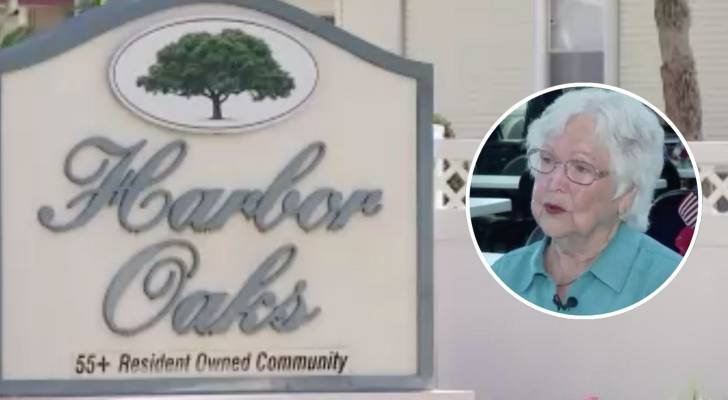
Finding affordable housing in Florida has become increasingly difficult, even in mobile home parks, which were once considered a low-cost option. While apartment rents remain high, some mobile home residents now pay nearly $1,000 a month just to rent a lot.
But in Fruitland Park, a community about an hour outside of Orlando, one mobile home park is bucking that trend. Nancy Hurt has lived in Harbor Oaks Homeowners Cooperative, Inc., for more than 30 years. Unlike residents in corporate-owned parks, she pays just $125 a month, which includes trash collection, water and yard maintenance — a rate that’s near-mythical in today’s rental market.
“Our maintenance fee does not go up,” Hurt told News 6. “They manage to get income from different sources in the park, which allows us to pay the $125.” Those sources include dock rentals and boat trailer parking, thanks to the park’s location along Lake Griffin.
The secret? Cooperative ownership.
Don’t miss
- I’m 49 years old and have nothing saved for retirement — what should I do? Don’t panic. Here are 6 of the easiest ways you can catch up (and fast)
- Want an extra $1,300,000 when you retire? Dave Ramsey says this 7-step plan ‘works every single time’ to kill debt, get rich in America — and that ‘anyone’ can do it
- Robert Kiyosaki warns of a ‘Greater Depression’ coming to the US — with millions of Americans going poor. But he says these 2 ‘easy-money’ assets will bring in ‘great wealth’. How to get in now
Resident-owned communities offer more control — and lower costs
Harbor Oaks became a resident-owned cooperative in 1996. That means residents collectively own and manage the park through a board of directors, rather than paying rent to a corporate landlord looking to make a profit.
“Resident-owned means that you control the park,” said fellow Harbor Oaks resident Geno Moser. “No corporation comes and just takes over and runs you in the ground.”
Even non-shareholders living in Harbor Oaks pay less than residents of corporate-owned parks. Paul Nowak, president of the homeowners association, told News 6 that renters pay around $400 a month, which includes the $125 maintenance fee.
It’s a major difference from the rising trend in corporate ownership of mobile home parks across Florida, where many residents report that monthly lot fees have increased sharply. According to a News 6 investigation, there are now more than 700 resident-owned parks across the state, giving residents more options.
In Florida, mobile home communities generally fall into one of three categories:
- Full-rental parks, where a company owns both the home and the land and residents are tenants.
- Land-lease parks, where residents own their homes but rent their land. This can create challenges if the house is old and unable to be moved when the rent increases.
- Resident-owned cooperatives where homeowners collectively buy and manage the park.
While all models have their pros and cons, many residents and experts say cooperatives offer more control, better stability and lower costs.
“They’re not here to make money,” said Betsy Barbieux of Florida CAM Schools LLC, which trains managers of homeowners associations. “They’re here to pay bills and so you have a more conservative approach to the budget.”
Read more: You don’t have to be a millionaire to gain access to this $1B private real estate fund. In fact, you can get started with as little as $10 — here’s how
How to join or become a resident-owned mobile park
Most resident-owned parks start as traditional rental communities. However, when an owner decides to sell, Florida law grants tenants a right of first refusal, allowing them to band together and make an offer before the park hits the market.
“The landlord wants to sell the park. The law protects the owner-renters by giving them the right of first refusal to purchase the park,” explains Barbieux. That means the owners can purchase the park and manage it themselves.
If you’re looking for a co-op park, search online using terms like "resident-owned mobile home communities" or "co-op mobile home parks." This model can be a lifeline for retirees or working-class residents trying to manage costs on a fixed income or cope with the rising costs of food and daily necessities.
Barbieux recommends that prospective mobile home residents ask plenty of questions before signing a lease and consider a co-op over a corporate-owned park whenever possible.
“Just ask a lot of questions and be sure. They should very definitely consider a co-op rather than a rental park."
What to read next
- Financial aid only funds about 27% of US college expenses — but savvy parents are using this 3-minute move to cover 100% of those costs
- Here are the 6 levels of wealth for retirement-age Americans — are you near the top or bottom of the pyramid?
- Here are 5 ‘must have’ items that Americans (almost) always overpay for — and very quickly regret. How many are hurting you?
- How much cash do you plan to keep on hand after you retire? Here are 3 of the biggest reasons you’ll need a substantial stash of savings in retirement
Money doesn’t have to be complicated — sign up for the free Moneywise newsletter for actionable finance tips and news you can use. Join now.
This article provides information only and should not be construed as advice. It is provided without warranty of any kind.